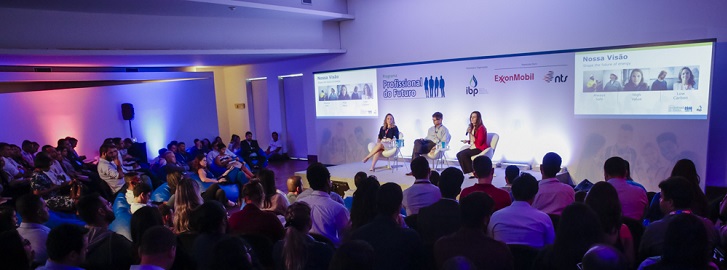Rio Oil & Gas discusses the future of the industry

Experts discuss issues that will affect the industry and speak to future professionals
Rio de Janeiro, September 25, 2018 – The second day of the 19th edition of Rio Oil & Gas started focusing on the future. National and international speakers discussed issues of importance to the segment and launched the activities of the Professional of the Future program at the event.
Mature Fields
The panel “The Future of Mature Offshore Fields” discussed the exploration of this rather underdeveloped segment in the country, which now wins bigger proportions with the new ANP resolution that provides for reduced royalties in more than 240 areas.
Marcelo Castilho, superintendent of the National Petroleum Agency, spoke about the importance of developing the full potential of Brazilian industry and stressed: “We need different corporate profiles with new experiences.”
The issue of the recovery factor on mature fields was also highlighted by Castilho as one of the challenges faced by the country. The Norwegian experience was shown as an example of what can be done, and Unni Sunnset, Equinor’s director, said that the Norway’s index is 50% – far above the global average of 30%. “Our goal is to raise the recovery factor to 60 percent and redevelop other 20 fields in the North Sea”, said the executive.
In Brazil, Nelson Queiroz Tanure, CEO of PetroRio, highlighted the company’s experience in the redevelopment of mature fields and commented on their performance in the Polvo field, which production has grown by 50% – with an increase of 3,500 barrels per day. “We have operated Octopus since 2014. The field would be abandoned in 2016, but we invested and managed to extend its lifespan to at least 2024”, he said.
Artificial intelligence and Data Science
Artificial intelligence and data analysis is a one-way road in the oil & gas industry. The conclusion was unanimous in the special session in which companies such as Repsol Sinopec, BHGE and IBM Research introduced industry-specific solutions that have ensured efficiency to companies and optimized employee time. Executives argued that the inclusion of artificial intelligence does not replace human work. Instead, it allows them to dedicate more time to more complex issues.
“In shale gas, for example, we have an 85% success rate in interpreting data from large databases. This index, however, varies greatly across the industry”, said Ulisses Mello, director of the IBM Research Center.
Marcio Affonso, BHGE’s software solutions architecture leader, compared the treatment of large databases to finding a needle in the ocean. “We want to understand rare problems and predict what will happen in the future to mitigate difficulties and risks in our operations”, said the executive. “We can now make more specific proposals that address the needs of each company”, added Repsol Sinopec’s R&D Engineer, Anderson Leocadio da Nova.
Professional of the Future
The Professional of the Future, a program of the oil & gas industry targeted at students, began its activities at Rio Oil & Gas 2018 on this Tuesday morning (25). More than 200 university students and young professionals participated in conversations with industry experts, as well as in a career workshop with the headhunter and partner at Weplace, Alessandra Simões, who prepared practical guidelines.
Raízen’s CEO, Luís Henrique Guimarães, spoke about the transformation of the industry and gave some tips for professionals interested in making a career in this field: “despite the political moment that Brazil is going through, marked by a strong polarization, students and young professionals in the energy industry are in the right country at the right time. The energy transition will create many career opportunities”, he explained.
Raquel Figueiras, an IBP senior economist and analyst, told how she shift her career from being an economist in the public sector to a professional in the energy industry. “At one point, I understood that I needed to enhance my academic background, but Master’s programs in technical fields were not appealing. Studying energy, a brand new field for me, opened new doors and was the great turning point in my career”, she said.
The presentation also focused on the skills a professional should develop. According to Equinor’s Development Manager, Gabriele Botelho, “having digital minds, and that means not only being digitally included, but having digital attitudes, being cooperative and sharing knowledge, and capacity to mobilize are very well-regarded profiles” .
Rio Oil & Gas will be held until Thursday (27), with five thematic blocks that will address Exploration and Production, Downstream, Gas & Energy, Supply, Industry Management, and Digital Technologies. Eleven parallel events will take place, bringing together specialists in technology, sustainability, SMS (Health, Environment and Security), certification, exploration, downstream and professional development.
The complete schedule can be accessed through the portal www.riooilgas.com.br or through the App, available for download at Google Play or the App Store.